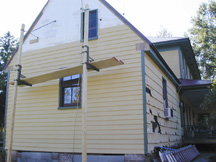
Volume XVII, Issue 43 ~ October 22 - October 28, 2009
Home \\ Correspondence \\ from the Editor \\ Submit a Letter \\ Classifieds \\ Contact Us
Dining Guide \\ Home & Garden Guide \\ Archives \\ Distribution Locations \\ Advertising
![]()

Our Old House
We’ve been getting ready for the holidays for 20 years now
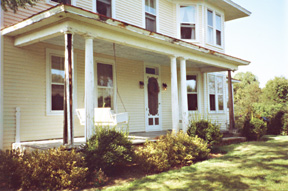
by Margaret Tearman
Rain on our tin roof woke me this morning, usually a pleasant wake-up call. But today it held all the charm of a New York City trash truck. As is usually the case, we are in the middle of a home project, this time rebuilding the exterior kitchen walls. We went to bed with one-third of the building fully exposed to the elements, and the unpredicted dousing was bad news.
Barefoot, still clad in pajamas, we tore downstairs. Expecting to see soggy drywall, we were pleasantly relieved. The rain fell softly, straight down, and the piece of plastic nailed up the night before was enough to keep the interior dry.
Just another day in old house restoration paradise.
Dream — or Nightmare?
I have long dreamed of living in an old farmhouse, like John-Boy Walton and his TV family. So when I met the man who I would one day marry, I thought my dream had come true: Tom had bought and just begun the restoration of an early 19th-century farmhouse in Calvert County.
The first time I saw the house, I was undercover, dragging a girlfriend along to spy on the house that this man I found so attractive talked so much about. To escape detection, we drove by fast, and I could only grab a furtive glance. It was dusk, and in the fading light, the old four-square with gingerbread and porches took my breath away.
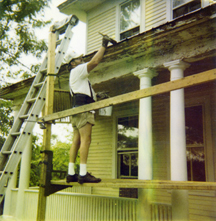
![]() A week later, Tom invited me to visit. Up close, I could hardly breathe. The porches that from the road looked so inviting were rotting away, duct tape held together more than one old window and rust covered the original tin roof.
A week later, Tom invited me to visit. Up close, I could hardly breathe. The porches that from the road looked so inviting were rotting away, duct tape held together more than one old window and rust covered the original tin roof.
Inside it was worse. The wood floors were covered with tiles, affixed with mastic more like tar than glue. Where there was no tile, there was stained carpet. Perhaps to hide cracked plaster, every room had been wallpapered.
The kitchen had been remodeled in the 1960s. The orange, gold and olive green in the stained carpet matched the wallpaper with its sailing ships and wine bottles. The only modern appliance was an olive-green portable dishwasher.
And this was after many months of back-breaking cleanup by Tom.
The only positive was that there were two working toilets, running water, and electricity — in most of the rooms.
By some miracle of vision (or lack of a good prescription), I saw what Tom had already envisioned: The tiles could be pulled up and the wood floors refinished. The wallpaper could be torn off, the plaster repaired and the walls covered with fresh paint. Magic would happen with new bathroom fixtures, new curtains and new kitchen appliances.
I didn’t realize — and had I known, I would have run for the hills — I had been bitten by the old house restoration bug. I had also fallen in love with the man who was crazy enough to live in this project.
Taking Sides
As is always the case in do-it-yourself home remodeling, it looks easier than it is. Replacing rotted clapboards in theory shouldn’t be that big of a job. But on an old house, nothing is as it should be. The word clapboard originates from the Dutch word Klappen, to split, because the planks were originally hand-split from logs of white pine, hemlock, spruce or cypress. Clapboard is also known as lap siding, beveled wood siding, wood plank, or weather board. It is used typically for exterior horizontal siding that has one edge thicker than the other and where the board above laps over the one below. We had some choices in our replacement project. Wood clapboards come in a variety of wood species, widths and lengths. Today, clapboard siding is often imitated using vinyl, aluminum or engineered wood. The most historically unauthentic choice would be aluminum or vinyl siding. It would be the easiest to maintain over the years and the least expensive material. But we didn’t think it was a good fit for our old house. The greenest choice would probably be engineered wood. Engineered wood, or composite wood, is made with wood products and other materials. Oriented-strand board (OSB), hardboard and veneered plywood are engineered wood products. The boards may be molded to create the look of traditional clapboards. But because the textured grain is uniform, it does not look exactly like real wood, especially up close. If we were building new, engineered would garner serious consideration. But as we are restoring an old house, we want the most authentic material available. We also want to match the rest of the house. So we chose old-fashioned wood. While the original clapboards on our house were hand-sawn from pine, cedar and redwood are naturally resistant to decay and are less appetizing to insects. So we chose western red cedar. |
Home Sweet Home
That was 21 years ago. When I married Tom, I married the house. Our marriage vows — the ones in which we promised for better or for worse, in richer or poorer — should have included with or without a roof, in hot water or without any at all.
Now, together, we are restoring this house; we are not remodeling it. And this is our biggest challenge. How do we make a 19th century house work in the 21st century?
We have learned a lot about resourcefulness and recycling. But most of all, we’ve learned that no job is as simple as we think, and everything takes twice, if not thrice, as long to do as we planned. A budget? It’s nothing more than a wishful guideline.
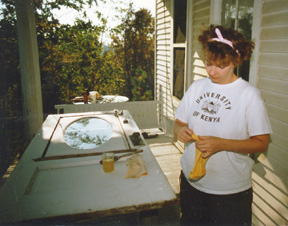
![]() We’re making slow progress. Both porches have been repaired, with their original columns restored, and Tom has replicated the railings that were lost to decay. We had a new tin shingle roof installed, one identical to the original. Two of the main eight rooms are finished and gorgeous. Still, only three rooms are livable, and three others are closed to the public. We’ve made the two bathrooms visually appealing, but they are just adequate in space and function.
We’re making slow progress. Both porches have been repaired, with their original columns restored, and Tom has replicated the railings that were lost to decay. We had a new tin shingle roof installed, one identical to the original. Two of the main eight rooms are finished and gorgeous. Still, only three rooms are livable, and three others are closed to the public. We’ve made the two bathrooms visually appealing, but they are just adequate in space and function.
Some of the bigger projects were delayed by bigger problems.
On one of the coldest January days in years, our well gave up its last drop, and a new one had to be drilled. There went the budget.
A Memorial Day picnic came to a screeching halt — at least for us, the hosts — when the water pipe to the second-floor shower sprung a leak, raining drywall and muck into our living room. Tom spent that happy gathering on a ladder, patching pipe and ceiling.
The biggest and most gut-wrenching stop-work order was issued by an oncologist. Stricken by cancer, Tom underwent several surgeries followed by months of treatment. His DeWalt tools spent several years gathering dust while Tom regained his health.
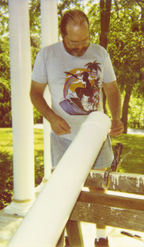
![]() Now healthy with tools in hand, the kitchen is our project du jour. A friend asked Tom if we’d be finished by Halloween. Tom laughed and replied he’d be happy to be done by Thanksgiving. Christmas was more realistic.
Now healthy with tools in hand, the kitchen is our project du jour. A friend asked Tom if we’d be finished by Halloween. Tom laughed and replied he’d be happy to be done by Thanksgiving. Christmas was more realistic.
The first week I moved into the house, I decreed that the kitchen had to go. It was early October, and I anticipated hosting Thanksgiving. Tom rolled his eyes. He knew what I had yet to learn: It just looks easy.
We ripped out the putrid carpeting, hoping to expose sturdy wood floors; we found a plywood sub-floor over rotted wood. While ripping off the wallpaper depicting Christopher Columbus’ dream vacation, I punched through the wall, exposing daylight. It wasn’t hard. There was nothing between the drywall and the exterior siding.
Lesson learned. A kitchen redo by Thanksgiving was out of the question. So we compromised with a cosmetic bandage: We painted the sub-floor in a checkerboard pattern, the wallpaper in a neutral off-white. When the original exterior clapboards had begun to rot, a former resident applied their version of a cosmetic bandage: particleboard. But it, too, was deteriorating. A few coats of paint hid the worst blemishes.
Current State of Affairs
Things haven’t worked out quite as planned. Twenty years later, we’re just two years into our 10-year plan. We had intended to spend this year finishing the last two rooms on the first floor, one for a library and the other for an office of my own. But the state of the kitchen has put those plans on the back burner.
Our interior patches are holding, although the floor paint has in places worn through. The painted wallpaper is at least stable.
The siding, however, is beyond salvage. Woodpeckers have started the demolition, pecking off chunks of rotted boards in search of dinner. The siding can’t wait for the new office and library.
The kitchen is in what was the property’s original house. Referred to as a single pen, it is one room with a steep set of stairs leading to a sleeping area. Decades ago, it was joined to the main house with a breezeway.
Originally it likely contained a fireplace, table, a few chairs and maybe a cupboard and crude shelves. Restoring it to its historic glory is out of the question. We’re simple folk, but we do expect indoor plumbing and refrigeration. But I’m getting ahead of myself.
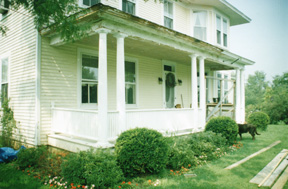
![]() This month we ripped off the old siding, exposing the tenon-and-mortised, post-and-beam frame. Naked, the old building revealed some secrets. Under the staircase, a door had been hidden behind drywall. It opens to a storage area that we discovered was once used to store bags of flour. We found a handful of tiny corn cobs probably once jammed in holes to keep out mice and snakes. And a colonial clay pipe, sitting on a beam, set there and perhaps forgotten by an early resident. Poking into the house’s history is great fun, and we can spend days sleuthing.
This month we ripped off the old siding, exposing the tenon-and-mortised, post-and-beam frame. Naked, the old building revealed some secrets. Under the staircase, a door had been hidden behind drywall. It opens to a storage area that we discovered was once used to store bags of flour. We found a handful of tiny corn cobs probably once jammed in holes to keep out mice and snakes. And a colonial clay pipe, sitting on a beam, set there and perhaps forgotten by an early resident. Poking into the house’s history is great fun, and we can spend days sleuthing.
But a rainy forecast is urging action. It’s time to get to work.
Efficient solid insulation is replacing old fiberglass, and the exterior will be wrapped in a weather-tight moisture barrier. The new siding will be cedar clapboards, beveled with a five-inch reveal, just like the original. The rot-resistant cedar should outlive us both. Tom tried to salvage the original trim, but it was too far gone. So he’s replicated it, down to the beaded detail. The three rickety old windows — none the same size — are being replaced with new energy-efficient versions in the exact design as the originals. Expandable foam insulation will seal any air leaks. This winter, we’ll be nice and toasty in our bony old kitchen.
Barring some unforeseen disaster, the exterior will be finished before the snow flies. I doubt we’ll make it by Thanksgiving, which is fine as I’m not hosting dinner. Christmas is possible.
© COPYRIGHT 2009 by New Bay Enterprises, Inc. All rights reserved.
